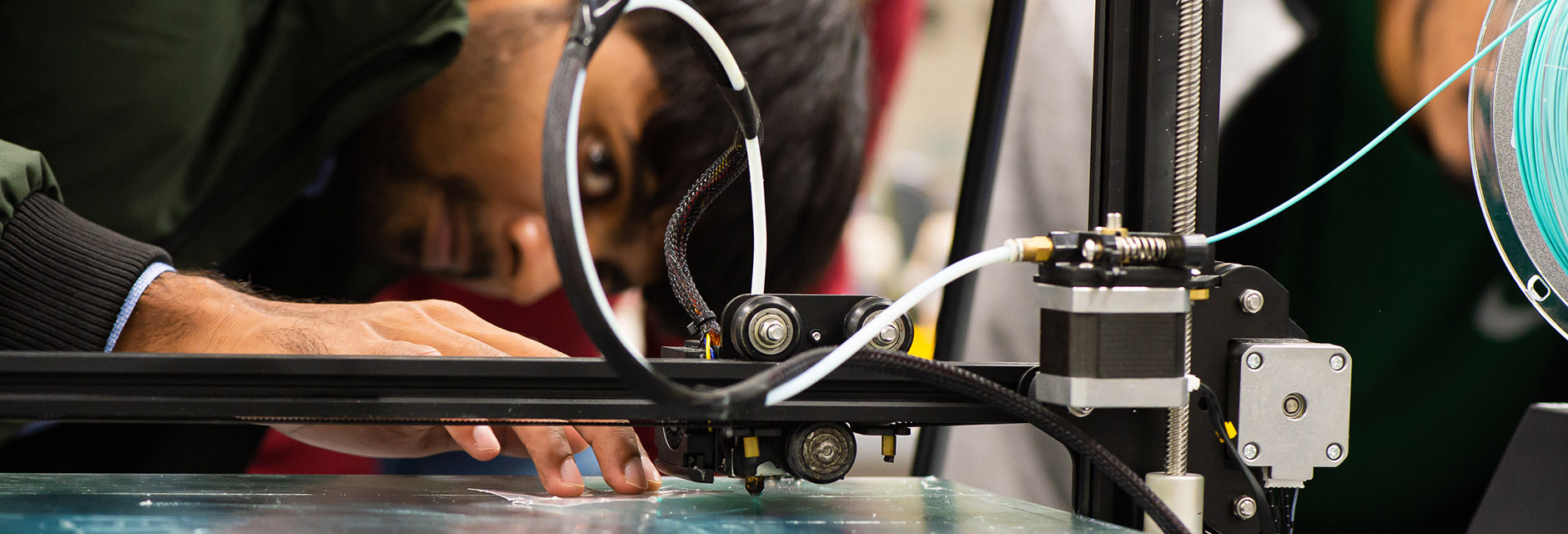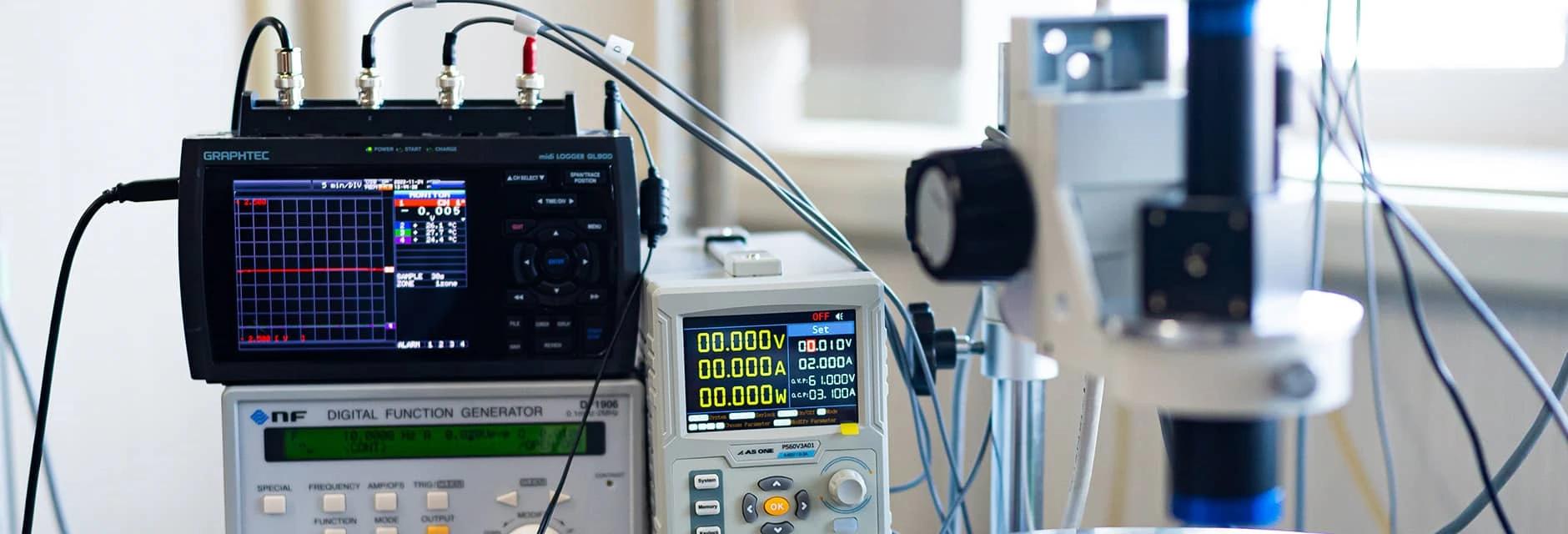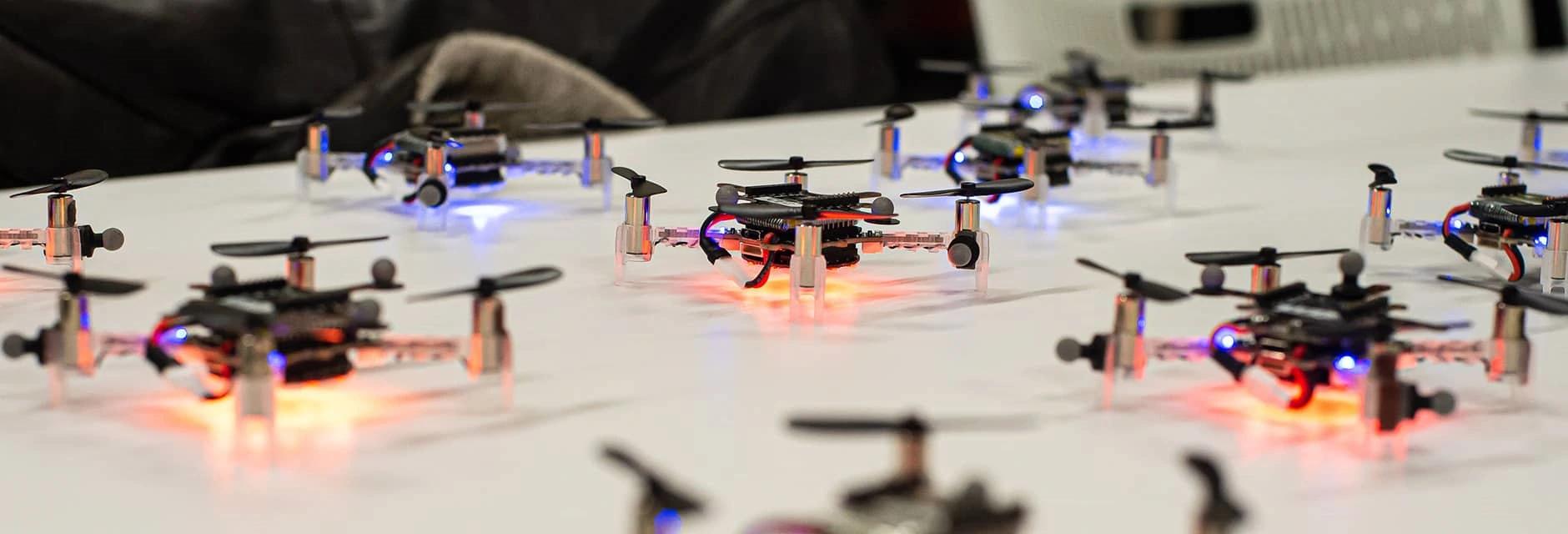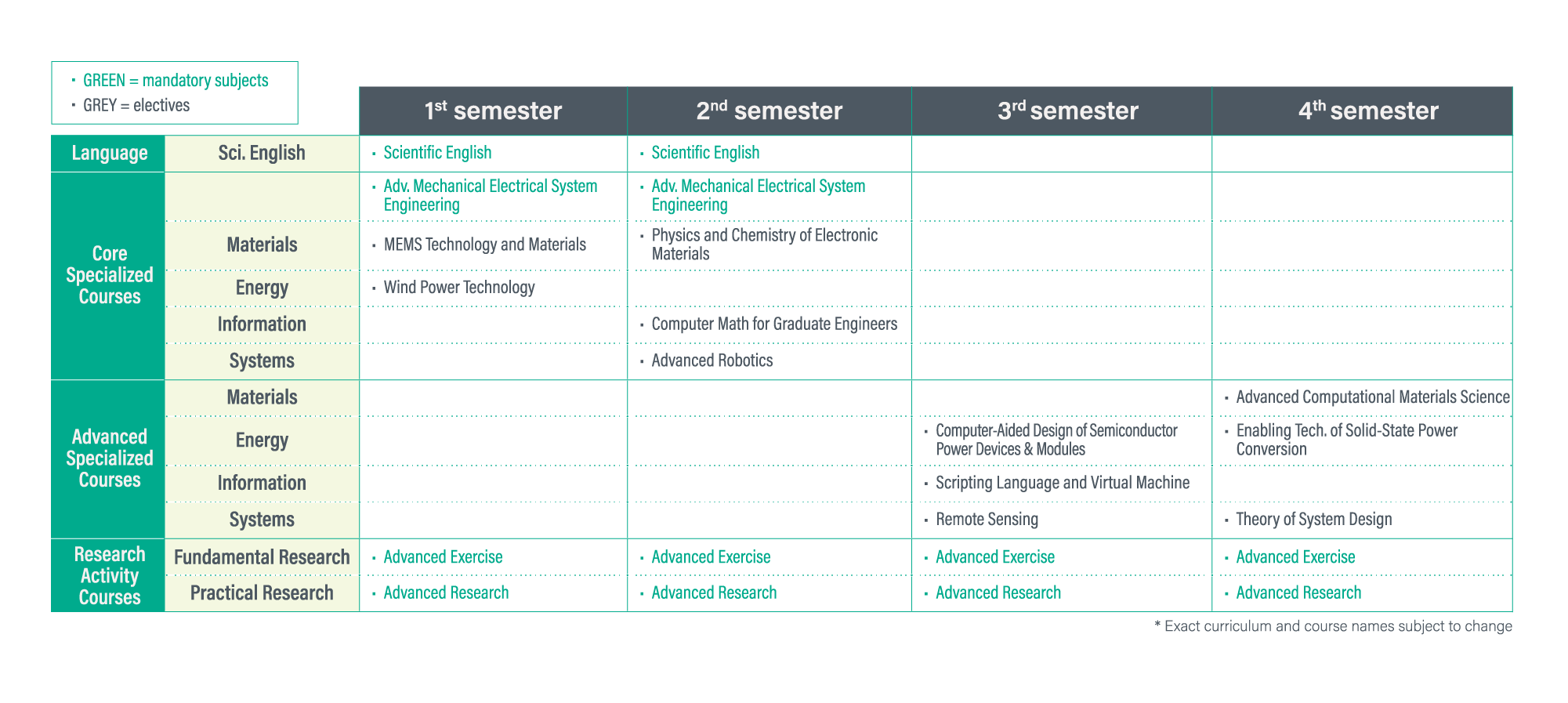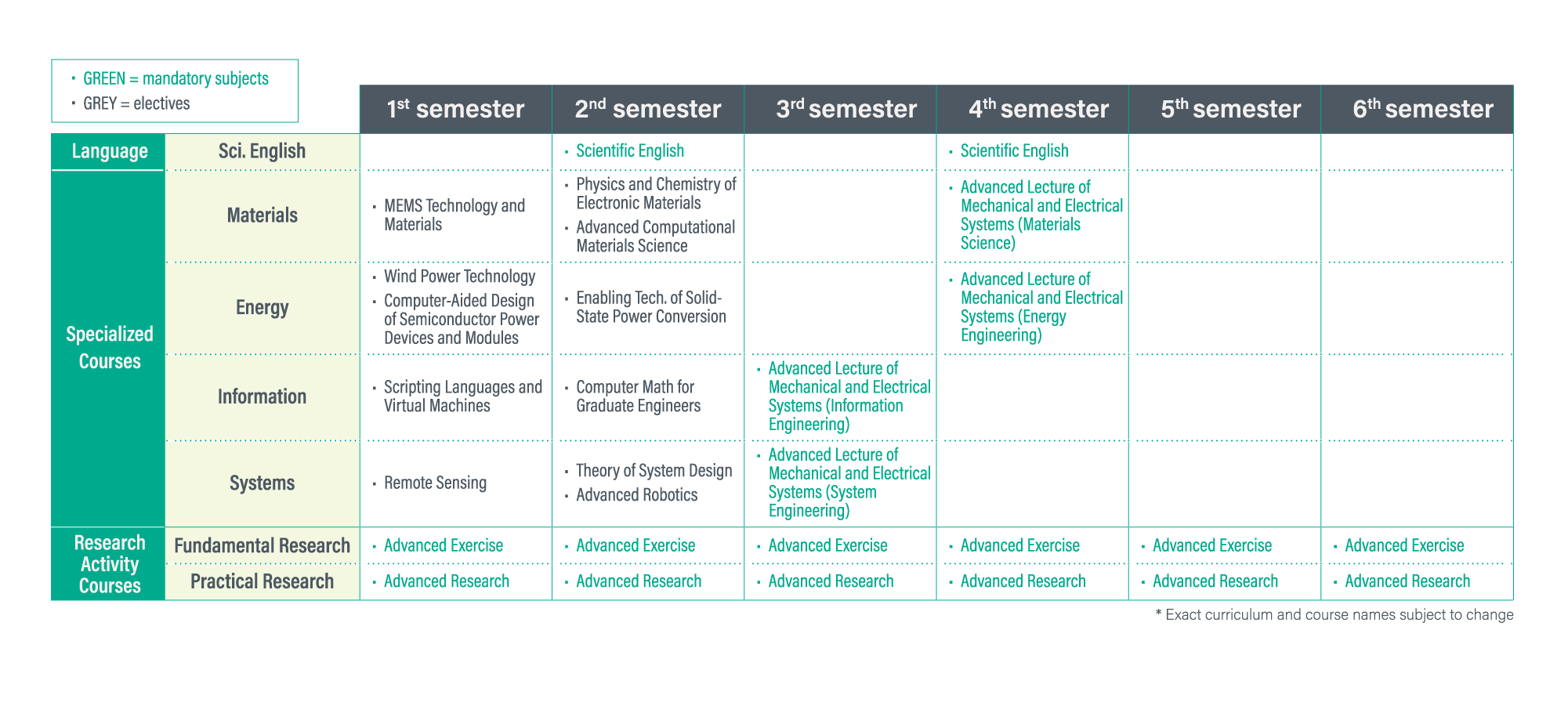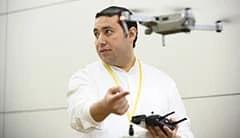Engineering (Graduate)
- Introduction
- Key Features
- Field of Study
- Curriculum
- Facilities
- Career
KUAS Graduate School of Engineering aims to provide engineering and research knowledge to scholars who possess exceptional problem-identifying abilities and awareness of trends in various academic fields and social needs. Furthermore, the programs seek to impart advanced knowledge in specialized fields indispensable to the creation of the next generation of mechanical and electrical systems, as well as the establishment of next-generation industries and concepts leading to “new values”. In addition, “ORT” (On-the-Research Training) will be provided in cutting-edge research facilities led by internationally-renowned professors.
Policies
In the Master’s Program, students will acquire the qualities of a professional, highly qualified engineer who can contribute to the creation of next-generation industries and “new value” by acquiring advanced knowledge in specialized fields. This knowledge is essential for next-generation mechanical and electrical systems while also connecting those initiatives in other fields. In the Master’s Program, students focus on one of the 4 fields that constitute the field of mechanical and electrical systems engineering: “Materials”, “Energy”, “Information”, or “Systems”.
Diploma Policy
For the “Master of Engineering” degree to be granted, Master’s Program students are required to study for the designated period, take subjects prescribed by the Master’s Program established in accordance with the Graduate School of Engineering Curriculum Policy, obtain the designated number of credits (34 credits), and pass a review and examination of their master’s thesis. The review and examination of their Master’s thesis will be based on whether students have achieved the following:
- The student has acquired a deep knowledge while relating their own research to other fields, and can utilize this knowledge to solve problems in a global society while focusing on any of the fields of “Materials”, “Energy”, “Information”, or “Systems”, within the scope of mechanical and electrical systems engineering.
- The student is able to collect the necessary information on the research topic they have independently established using the appropriate methods, such as literature research and experiments, with a focus on any of the fields of “Materials”, “Energy”, “Information”, or “Systems” which constitute the field of mechanical and electrical systems engineering. Then, they must use this information while correlating it with knowledge of other fields and logically, critically, and objectively analyzing the outcomes.
- The student possesses a deep knowledge of the field of mechanical and electrical systems engineering and can discuss these topics with others in English.
- The student can logically construct and express their own ideas through a multi-perspective approach utilizing the deep knowledge, skills, and experience acquired in any field of mechanical and electrical systems engineering.
Curriculum Policy
In order to develop graduates with the capabilities listed in the Diploma Policy, the educational program will be implemented based on the following policies:
- This course aims to cultivate students’ ability to explore truth from various angles in relation to knowledge in other fields by allowing them to undertake core courses and advanced courses related to advanced specialization, mainly associated with either “Materials”, “Energy”, “Information”, or “Systems” in mechanical and electrical systems engineering.
- Students will be able to develop independent abilities to take action and solve problems based on expert knowledge through Advanced Exercise and Research Courses related to their research fields centered on the fields of “Materials”, “Energy”, “Information”, or “Systems” which constitute mechanical and electrical systems engineering.
- Students will undertake Scientific English Courses and develop their communication skills related to their specialized field, such as oral presentations in English, reading documents, writing papers, and critically evaluating papers.
- In parallel with the undertaking of Scientific English Courses, core courses, and advanced courses for the development of specialized knowledge, students will learn in Advanced Exercise and Research Courses linked to the development of communication, collaboration, problem-finding, and leadership skills.
Curriculum Map and Subjects
Based on their academic achievements in their undergraduate studies, Master’s Program students will aim at achieving a high level of ethics, and expertise in one of the 4 fields of mechanical and electrical systems engineering: “Materials”, “Energy”, “Information”, or “Systems”, and a broad understanding of the other 3 fields. Master’s Program courses are divided into 3 categories: “Specialized Courses”, “Scientific English Courses” and “Research Activity Courses “.
Curriculum Map (Click to enlarge)
(1) Specialized Courses
Specialized Courses are divided into core courses and advanced courses. In both the core and advanced courses, “Materials”, “Energy”, “Information”, or “Systems” will form the main subject, and all courses will contain content that straddles the other fields to foster multi-perspective thinking.
(2) Research Activity Courses
Subjects related to research fields are classified into Fundamental Research and Practical Research, and all subjects are compulsory. Students will acquire basic problem-solving skills by reading theses and specialized knowledge related to their research themes. Furthermore, students will practice problem-solving through guidance on the preparation of a master’s thesis and guidance on experiments and practical training based on their research themes.
(3) Scientific English Courses
Scientific English Courses will be established as mandatory subjects in order to develop communication skills in specialized fields such as oral presentations in English, reading scientific papers, thesis writing, and criticism.
Graduation Requirements
The master’s course is a two-year program.
To obtain the degree of Master of Engineering from KUAS students are required to be enrolled at KUAS for a two-year period (four full semesters of instruction), obtain 34 credits or more from coursework, prepare a master’s thesis (which must be approved by their supervisor), and pass a final examination.
Policies
In the Doctoral Program, students focus on studying one of the 4 fields that constitute mechanical and electrical systems engineering: “Materials”, “Energy”, “Information”, or “Systems”. At the same time, they will deepen their knowledge of the other 3 fields, thereby broadening their understanding and increasing their high-level specialization as cross-disciplinary experts who possess exceptional problem-identifying abilities that take into account the trends of various academic fields and social needs. Through the creation of new concepts, these scholars will aim to become researchers who can contribute to the creation of next-generation industries and the creation of “new value”.
Diploma Policy
For the “Doctor of Engineering” degree to be granted, Doctoral Program students are required to study for the designated period, take subjects prescribed by the Doctoral Program established in accordance with the Graduate School of Engineering Curriculum Policy, obtain the designated number of credits (36 credits), and pass a review and examination of their doctoral thesis. The review and examination of their Doctoral thesis will be based on whether students have achieved the following:
- The student has further specialized their knowledge in one of the fields of “Materials”, “Energy”, “Information”, or “Systems”, in the field of mechanical and electrical systems engineering, as well an in-depth knowledge of the other 3 fields. They should be able to utilize that knowledge to solve the problems faced by global society while correlating the 4 fields in an integrated, comprehensive manner.
- The student is able to collect necessary information using appropriate methods such as literature research and experiments in relation to the research topic they have set for themselves, and should be able to utilize the knowledge they have specialized in any of the 4 fields (“Materials”, “Energy”, “Information”, or “Systems”) in an integrated way with the other 3 fields to concretely identify problems through objective analysis and logical and critical considerations, then creatively achieve solutions to those problems in the general field of mechanical and electrical systems engineering.
- The student can express their opinions and discuss them with others in English using the deep knowledge they have obtained in the field of mechanical and electrical systems engineering.
- The student can logically construct and express their own ideas through a multi-perspective approach by utilizing their knowledge, skills, and experience in the field of mechanical and electrical systems engineering.
Curriculum Policy
In order to develop graduates with the capabilities listed in the Diploma Policy, the educational program will be implemented based on the following policies:
- Students will be required to acquire advanced expertise in the 4 fields of mechanical and electrical systems engineering: “Materials”, “Energy”, “Information”, and “Systems”, and develop the ability to explore truths from multiple angles through comprehensive scholarship that integrates the 4 fields.
- Students will study one field of expertise in depth while simultaneously deepening their knowledge in the 3 related fields to acquire the ability to independently identify and creatively solve issues based through Advanced Exercise and Research Courses related to the field of mechanical and electrical systems engineering.
- Students will undertake Scientific English Courses and develop their communication skills related to their specialized field, such as oral presentations in English, reading documents, writing papers, and critically evaluating papers.
- In parallel with the undertaking of Scientific English Courses and specialized courses in mechanical and electrical systems engineering for the development of specialized knowledge, students will learn in Advanced Exercise and Research Courses linked to the development of communication, collaboration, problem finding, and leadership skills.
Curriculum Map and Subjects
Based on the results of studies pursued in the Master’s Program, Doctoral Program students will rapidly analyze trends in advanced academic information and advanced technology, set research subjects from a unique perspective, and aim to carry out research actively. As with the first semester of the Master’s Program, the subjects offered are divided into 3 categories: “Specialized Courses”, “Scientific English Courses”, and “Research Activity Courses “.
Curriculum Map (Click to enlarge)
(1) Specialized Courses
Compulsory specialty subjects for the Doctoral Program will focus on either “Materials”, “Energy”, “Information”, or “Systems” with lectures regarding Materials Science, Energy Engineering, Information Engineering, and Systems Engineering. In addition to delving deeply into the subject of cutting-edge topics related to advanced science and technology, this course also refers to the relationship with the other 3 fields and teaches students the ability to solve problems by interrelating the 4 fields as comprehensive parts of mechanical and electrical systems engineering. Students can also take Specialized Courses offered in the Master’s Program, and acquire specialized and cutting-edge knowledge in all fields that constitute the field of mechanical and electrical systems engineering, including the field to which they belong.
(2) Research Activity Courses
As in the case of the Master’s Program, the subjects related to the research fields in the Doctoral Program will consist of Fundamental Research and Practical Research as compulsory subjects, and will be offered as subjects that will help students to solve their own topics of study. Students will acquire problem-solving methods through reading dissertations on research themes and acquiring specialized knowledge. Furthermore, students will practice problem-solving through guidance on the preparation of Doctoral theses and guidance on experiments and practical training based on individual research themes.
(3) Scientific English Courses
Scientific English Courses will be offered as compulsory subjects in order to further improve communication skills in specialized fields such as oral presentation, essay reading, essay writing, and stating opinions in English.
Students will acquire presentation skills to effectively present oral presentations and express opinions at international conferences, and the writing skills necessary for writing theses.
Graduation Requirements
The doctoral course is a three-year program.
To obtain the degree of Doctor of Engineering from KUAS students are required to be enrolled at KUAS for a three-year period (six full semesters of instruction), obtain 36 credits or more from coursework, prepare a doctoral dissertation (which must be approved by their supervisor), and pass a final examination.
